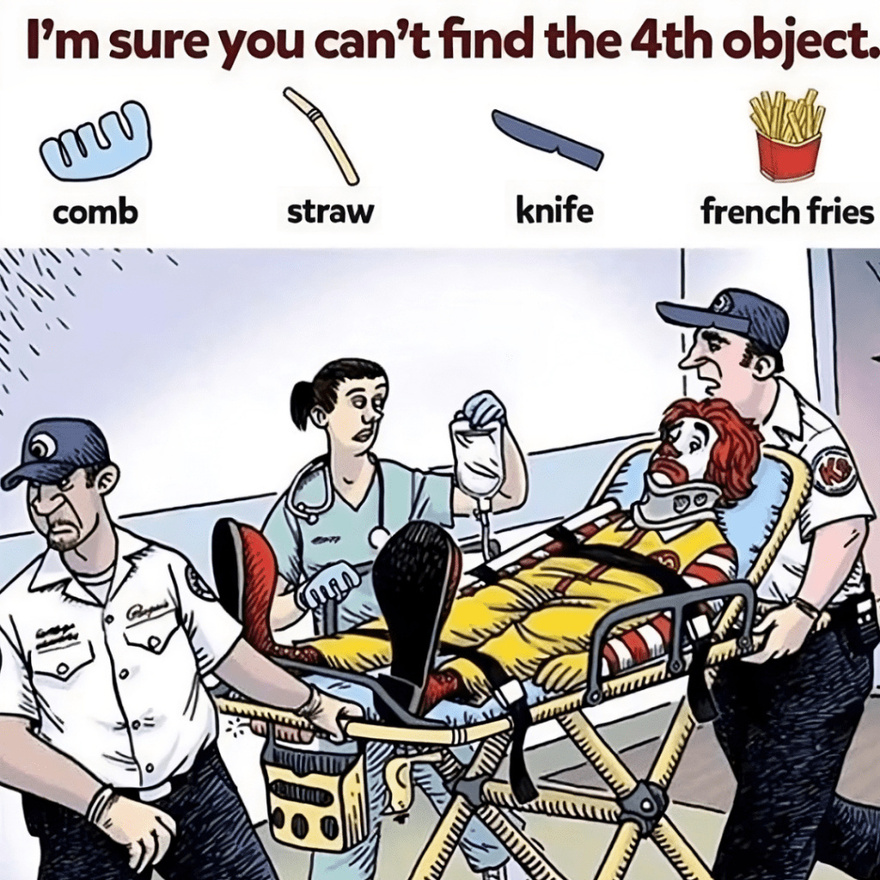Have you ever encountered a picture puzzle that left you scratching your head? This one is especially tricky, daring you to find four specific objects: a comb, a straw, a knife, and french fries.
Have you ever encountered a picture puzzle that left you scratching your head? This one is especially tricky, daring you to find four specific objects: a comb, a straw, a knife, and french fries. Seems easy, right? Don’t be so sure! Take a close look and see if you can locate them all—especially that elusive fourth item. If you’re up for the challenge, let’s break down some common mistakes, find each hidden item step-by-step, and uncover the mystery behind this mind-bending puzzle.

When faced with a puzzle like this, our eyes naturally gravitate toward the most obvious elements. But the trick here is to pay close attention to the smallest, often overlooked details. Here’s why many people struggle with puzzles like this one:
Expecting Objects to Be in Conventional Spots: We tend to look for objects like a comb or a straw in logical places, such as in a hand or near a drink.
Ignoring Tiny Details: Puzzles often hide objects in plain sight by blending them with the background or other objects, which can make them easy to miss.
Getting Distracted by Familiar Figures: Bright colors, prominent characters, or other familiar elements can be distracting, pulling our attention away from the real goal.
Now, let’s go on a step-by-step hunt to find each object.
Solving the Puzzle Step-by-Step
Here’s a breakdown of how to locate each item in this challenging visual puzzle:
1. Finding the Comb
The first object we’re searching for is the comb. Look closely at the nurse’s left hand. You’ll see she’s holding a comb, but it’s easy to overlook because it blends in so well with her uniform. The color and shape make it seem like part of her hand, but with a focused look, you’ll see it’s there.
2. Spotting the Straw
The straw isn’t where you’d typically expect it. Rather than being part of a drink or container, the straw is hidden in the medical setup. Check the IV bag that the nurse is holding. A thin straw is cleverly attached to the bag, camouflaged as part of the medical equipment. Once you spot it, you’ll realize this sneaky placement is what makes it so hard to find.
3. Locating the Knife
Now for the knife, which is a bit more challenging. It isn’t in anyone’s hand or on a surface where you’d expect it to be. Instead, look at the hat—yes, there’s a small knife tucked into the brim, blending in as an accessory. This clever placement makes it hard to spot, but it’s definitely there. With a little patience, you’ll see it’s been hiding in plain sight.
4. The Fourth Object: French Fries (Or Are They?)
This is where most people hit a wall. After all, finding french fries should be easy, right? But here’s the twist: there are no french fries in the image. That’s the real trick of the puzzle! People assume the fries must be hidden somewhere, and they’ll search for ages without success. The puzzle’s designer uses a psychological trick here, making you expect an object that isn’t actually present, which causes frustration and doubt.
Our brains are trained to look for what exists, not what’s missing. This puzzle cleverly plays on that assumption, making the “french fries” an impossible object to find—because they simply aren’t there. This mental trick challenges us to think outside the box and question our own perceptions, teaching us that sometimes the answer lies in what’s absent rather than what’s visible.
Wrapping Up: Share Your Experience!
Did you manage to find all four objects on your own, or did you need a little help? Let us know in the comments which item you found the most challenging. This puzzle is a fun way to test your observation skills and logic, and it’s a great one to share with friends and family to see who can spot the hidden objects fastest.
Puzzles like this are fantastic for sharpening our attention to detail and encouraging creative thinking. They remind us to question our assumptions and to sometimes look at things from a fresh perspective. So, the next time you encounter a tricky puzzle, remember this one—it’s a great example of how a shift in perception can reveal what’s hiding in plain sight.
Are you ready for more brain-bending puzzles? Practice spotting hidden objects and train your mind to notice every little detail. The more you practice, the better you’ll get at finding those elusive items in record time. Happy puzzling!



